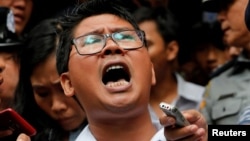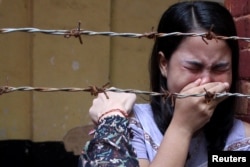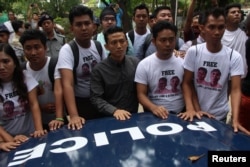The decision by a court in Myanmar to sentence two Reuters journalists to seven years in prison for breaching a law related to state secrets has been met with an angry response inside and outside the country, with critics calling it an attack on press freedom.
On Monday, a judge at Yangon northern district court found Wa Lone and Kyaw Soe Oo guilty of violating the country’s Official Secrets Act, a broadly worded law that dates back to when Burma, as it was then known, was under British colonial rule. The law calls for a maximum penalty of 14 years in prison.
The two were arrested in December in northern Yangon while investigating the killing of 10 Rohingya men in a village in northern Rakhine state in which military personnel were allegedly involved.
Wa Lone and Kyaw Soe Oo say someone handed them documents before police invited them to dinner and arrested them. The prosecution maintains the two were arrested during a routine patrol when the documents were found.
However, testimony in the case has revealed cracks in the prosecution’s argument. In April, police captain Moe Yan Naing, called as a prosecution witness, told the court the journalists were deliberately entrapped, while another official said he had burned his notes from the night of the arrests but could not explain why.
Pair defiant
Emerging from the court after the hearing, Wa Lone and Kyaw Soe Oo remained defiant.
“We have been unfairly accused,” Wa Lone told reporters as he was bundled into a police van that would take him and Kyaw Soe Oo back to prison. “We didn’t do anything harmful towards our nation. We didn’t commit any crime, but [the court] decided to convict us anyway.”
“This is directly challenging democracy and media freedom in our country,” he said.
There were passionate scenes as the pair left the court. Supporters attempted to stop the police van that was carrying them from them leaving. As the van drove away, Wa Lone and Kyaw Soe Oo smiled and held their arms aloft.
A government spokesperson could not be reached for comment.
“Our line of defense is that they were trapped, but the judge didn’t accept that,” the pair’s lawyer Khin Maung Zaw told reporters outside the court. “We prepared for the worst, but hoped for the best. The situation in the country is like this.”
‘Sad day’ for journalists
Stephen J. Adler, editor-in-chief of Reuters, called it “a sad day” for journalists everywhere.
“This is a major step backward in Myanmar’s transition to democracy, cannot be squared with the rule of law or freedom of speech, and must be corrected by the Myanmar government as a matter of urgency,” he said in a statement. “We will not wait while Wa Lone and Kyaw Soe Oo suffer this injustice and will evaluate how to proceed in the coming days, including whether to seek relief in an international forum.”
As well as the international outcry, Wa Lone and Kyaw Soe Oo have attracted support inside the country.
Support inside Myanmar
On Saturday, dozens of youths marched in Yangon showing their support for the two reporters. Demonstrators held aloft banners and chanted slogans calling for the journalists’ immediate release. Other reporters wore T-shirts that said “journalism is not a crime.”
Maung Saungkha, leader of free speech advocacy group Athan, told VOA the decision to jail them was “a deliberate threat against media and the people to silence the truth.”
“The decision of the court has ushered in a dark age for Myanmar’s freedom of press and right to information. We strongly condemn the decision and request the president (Win Myint) to grant a presidential pardon to Wa Lone and Kyaw Soe Oo,” he said.
The Foreign Correspondents’ Club of Myanmar also strongly condemned the ruling.
“The conviction and harsh sentence strike a blow to the journalistic profession and pose a grave threat to press freedom in Myanmar,” FCCM said in a statement. “We further urge the government to ensure that journalists are allowed to carry out their profession without fear of harassment and intimidation.”















